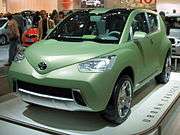Toyota ist
| Toyota ist | |
|---|---|
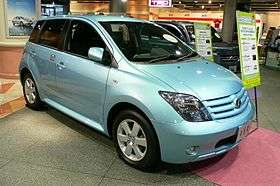 2005 Toyota ist (Japan) | |
| Overview | |
| Manufacturer | Toyota |
| Production | 2001–2016 |
| Body and chassis | |
| Class |
Subcompact car Subcompact crossover SUV |
| Body style | 5-door hatchback |
| Related |
Toyota Vitz Toyota Platz Toyota Belta Toyota Vios |
| Chronology | |
| Successor |
Toyota C-HR (Japan/Europe) Toyota Yaris Heykers (Indonesia) |
The Toyota ist (marketed with a stylized lowercase 'i') is a subcompact car made in Japan by Toyota. It is exported to the United States as the Scion xA and Scion xD, the Middle East as the Toyota xA and to Europe and Latin America as the Urban Cruiser for the second generation.
Derived from the suffix "-ist," the name points to a person who is passionate about something (stylist, artist, and so on).[1]
In Japan, it is available at Toyota dealerships Toyota NETZ and Toyopet Store.
The ist, the sixth brand to use the Vitz as the base model, was conceived as a high-end multi-use compact car with SUV-like styling and wagon-like roominess. The car was fitted with either a 1.3-liter (FWD) or a 1.5-liter engine (FWD or 4WD), with a Super ECT transmission. A wide front grille consisting of two thick horizontal bars, large 15-inch tires, and extended wheel arches gave the vehicle its unique and dynamic exterior styling. The body dimensions were a notch above those of the Vitz, giving more space to the cabin and the trunk. The 6:4 split rear seats could be fully folded to widen the deck as necessary. The sturdy body structure was realized through the advanced GOA (Global Outstanding Assessment) process, which enhanced safety in collisions with heavier vehicles.
First generation (XP60; 2001–2007)
| First generation (XP60) | |
|---|---|
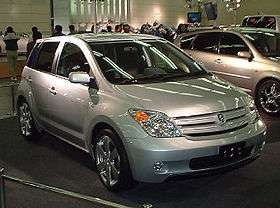 | |
| Overview | |
| Manufacturer |
Toyota Kanto Auto Works[2] |
| Also called |
Scion xA Toyota xA (Middle East) |
| Production | 2001–2007 |
| Assembly | Kanegasaki, Iwate, Japan (Kanto Auto Works) |
| Designer | Masanari Sakae (2000) |
| Body and chassis | |
| Class | Subcompact |
| Body style | 5-door hatchback |
| Layout |
FWD 4WD (Japan) |
| Related |
Toyota bB Toyota Platz Toyota Vitz Scion xA |
| Powertrain | |
| Engine |
1.3L 2NZ-FE I4 1.5L 1NZ-FE I4 |
| Transmission |
4-speed automatic 5-speed manual |
| Dimensions | |
| Wheelbase | 2,370 mm (93.3 in) |
| Length | 3,855 mm (151.8 in) |
| Width | 1,695 mm (66.7 in) |
| Height | 1,535 mm (60.4 in) |
| Curb weight | 1,100 kg (2,425.1 lb) |
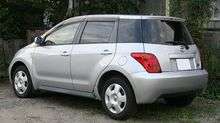
.jpg)
Based on the first-generation Toyota Vitz hatchback, the first-generation ist shared a platform with the Toyota Platz sedan.
The model codes are NCP60 (1300, 2NZ, FWD), NCP61 (1500, 1NZ, FWD), NCP65 (1500, 1NZ, 4WD).
The ist was developed from the Toyota Vitz supermini in a crossover SUV bodystyle offering the flexibility of larger SUVs, but with the advantage of better fuel economy from a smaller vehicle. It first appeared at the 2001 Tokyo Auto Show, and was placed into production in 2002.
The ist is meant to cater to younger drivers, being sold as a Scion in North America and as the xA in the Middle East. The ist interior features a unique interior with an easy to read central instrumental cluster position similar to the five-door Toyota Yaris/Vitz and the four-door Toyota Vios sedan. At its introduction, 42,000 orders were received in Japan.
Its primary competitor is the Honda Fit and the Nissan March. The first-generation car was used by the Shizuoka Prefectural Police as a police car.
Second generation (XP110; 2006–2016)
| Second generation (XP110) | |
|---|---|
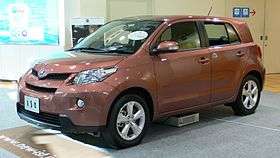 | |
| Overview | |
| Manufacturer | Toyota |
| Also called |
Scion xD Toyota Urban Cruiser |
| Production | 2006–2016 |
| Assembly |
Japan: Kanegasaki, Iwate (Kanto Auto Works, till 2012) Ōhira, Miyagi (Toyota Motor East Japan, 2012-2016)[3][4] |
| Designer | Junho Kim and Masaaki Yagi (2005) |
| Body and chassis | |
| Class | Subcompact |
| Body style | 5-door hatchback |
| Layout |
FWD 4WD (Japan) |
| Related |
Toyota bB Toyota Belta Toyota Vitz Scion xD |
| Powertrain | |
| Engine | 1.5L 1NZ-FE I4 |
| Transmission | CVT |
| Dimensions | |
| Wheelbase | 2,460 mm (96.9 in) |
| Length | 3,930 mm (154.7 in) |
| Width | 1,725 mm (67.9 in) |
| Height | 1,525–1,540 mm (60.0–60.6 in) |
| Curb weight | 1,150–1,210 kg (2,535.3–2,667.6 lb) |
The second-generation ist is similar to the five-door Toyota Yaris/Vitz; however, unlike the Vitz, the instrument gauges are now shifted in front of the driver as opposed to the middle of the dashboard previously.
This new ist, like its predecessor, is sold as a Scion in the US. But instead of being the new xA, it is called the xD. The only real difference between the ist and xD is a revised front fascia.[5]
In Europe and Latin America it is sold as the Urban Cruiser with slightly different front panels.[6]
In Japan, the ist is sold in 2 grades namely 150G and 150X and equipped with Super CVT-i for the 1NZ-FE option. One appealing offer for the 1NZ equipped model is the choice of AWD, which was not carried over to the US for the xD.[7] Furthermore, a center console is offered on Japan's ist, but not the US' xD.
Starting with production model year 2007 in Japan, G-BOOK, a subscription telematics service, is offered as an option.
The former Kanto Auto Works produced the Toyota ist from January 2010.[8]
The ist was discontinued in Japan on 29 April 2016.
Urban Cruiser
The Toyota Urban Cruiser is a mini MPV that is currently produced by Japanese automaker Toyota. It was first introduced in 2008 and is still in production. It slots below the Toyota RAV4 to compete against small crossover SUVs like the Nissan Qashqai and Kia Soul, while also attracting buyers of mainstream family hatchbacks. Designed by Toyota ED²,[9] it debuted at the March 2008 Geneva Motor Show and went on sale shortly thereafter.
Unfortunately, Urban Cruiser was not reached sales success in Europe since 2011 due to the ongoing strength of the Japanese Yen, and production was discontinued in 2014.
|
Mechanicals and emissions
The Urban Cruiser is powered by a 1,329 cc petrol engine that produces 100 hp (75 kW) and 132 N·m (97 lb·ft), as well as a 90 hp (67 kW), 205 N·m (151 lb·ft) 1,364 cc turbo diesel. Front-wheel drive is standard, but the diesel model is also offered with an all-wheel drive option. Both come with a 6-speed manual transmission. There is no automatic option.
Safety
Despite being equipped with seven airbags, anti-lock brakes and traction control, the car received a relatively poor Euro NCAP safety rating of 3/5 stars.[10]
Successor
The Toyota C-HR is the successor of the ist in Japan (or the Urban Cruiser in Europe), which is in the same class. The crossover SUV-like variant of the XP150 Yaris, the Yaris Heykers, which is sold in Indonesia, is also the successor in the same class.
References
- ↑ "Vehicle Lineage Chart Data: Origin of a car's name". Toyota-global.
- ↑ "Kanto Auto Works, Ltd". Kanto-aw.co.jp. Retrieved 2010-07-16.
- ↑ "Affiliates (Toyota wholly-owned subsidiaries)-Toyota Motor East Japan, Inc.". Toyota. 2012. Retrieved 2014-07-15.
- ↑ "Japanese Production Sites" (Press release). Japan: Toyota. 2016-03-06.
- ↑ "new toyota ist". Retrieved 2007-07-20.
- ↑ Paul Hudson (2009-07-01). "Toyota Urban Cruiser review". telegraph.co.uk. London. Archived from the original on 2010-07-22. Retrieved 2010-03-01.
- ↑ "Toyota iSt engine options". Retrieved 2008-02-15.
- ↑ "Affiliates (Toyota wholly-owned subsidiaries)-Toyota Motor East Japan, Inc.". Toyota Motor Corporation. 2012. Retrieved 2014-07-21.
- ↑ Mike Hanlon (March 2006). "Toyota mini SUV Urban Cruiser concept". gizmag. Retrieved 2011-03-16.
- ↑ "Toyota Urban Cruiser's crash test crash". euroNCAP.com. Retrieved 2009-11-26.
External links
| Look up -ist, -ist-, IST, or ist in Wiktionary, the free dictionary. |
| Wikimedia Commons has media related to |
